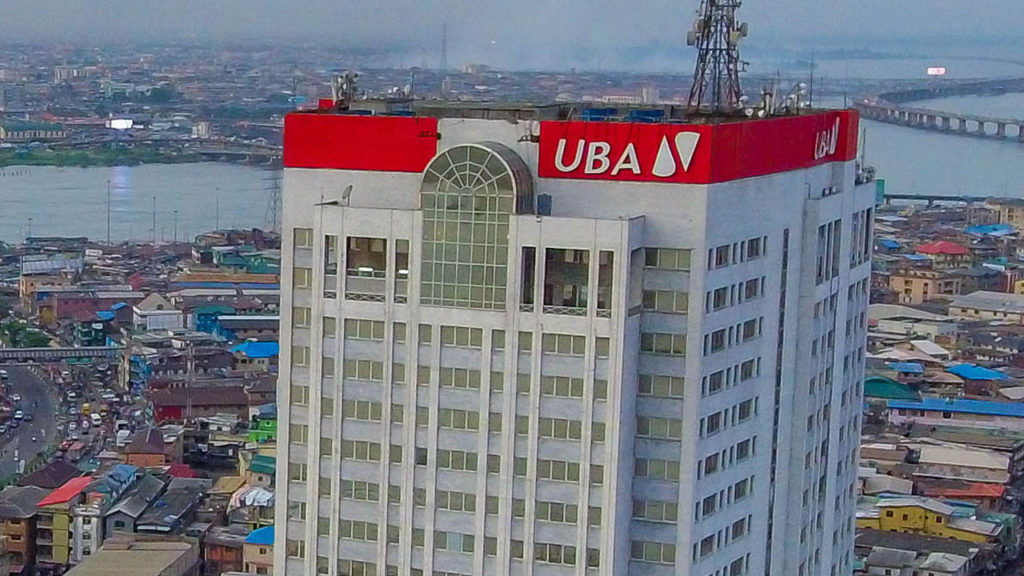News
UBA Committed To Boosting Financial Literacy In Northern Nigeria – Usoro
Published
9 months agoon

UBA Committed To Boosting Financial Literacy In Northern Nigeria – Usoro
Emem Usoro, an accomplished banker with over two decades of experience in various banking sectors, is currently the executive director of UBA’s Nigeria North Bank. Usoro, who has held key positions within UBA, served as the Directorate Head for Abuja and the North Central Bank. In this interview with LEADERSHIP, she explains the impact of Financial Literacy as a solution for boosting financial inclusion levels in Northern Nigeria, and the contributions of the bank, among others.
What are the biggest challenges ahead of the banking space in Nigeria, especially Northern Nigeria?
In my opinion, the biggest challenges ahead of the banking sector in Nigeria in the short to medium term include: Slow GDP growth; available data and forecasts for key macroeconomic indicators in the Nigerian economy, suggest that the economy will continue on a moderate recovery path through 2023 as legacy headwinds linger. These include insecurity in food producing areas; high cost of energy and rising cost of debt servicing.
Accordingly, the economy is forecast to grow in 2023 by 3.03 per cent (CBN), 3.75 per cent (FGN) and 3.29 per cent (IMF).
According to the National Bureau of Statistics (NBS), Real Gross Domestic Product (GDP) grew by 2.31 per cent (year-on-year) in the first quarter of 2023, compared with 3.11 per cent in the corresponding quarter of 2022 and 3.52 per cent in the preceding quarter. The economy moderated on its current recovery trajectory, posting positive, albeit lower growth, for the tenth consecutive quarter, in spite of a multitude of headwinds to its full recovery.
The growth performance was driven largely by the sustained growth in the services and agricultural sectors; progressive uptrend in economic activities across several sub-sectors; and sustenance of broad-based support by the CBN in growth-enhancing sectors; increasing wave of cybercrimes and cyberattacks. Disturbing trends in financial fraud and cybercrimes have put at risk electronic payment or e-payment transactions, now estimated to be worth an average of N30.2 trillion monthly. Findings show that as more Nigerians are embracing e-transactions daily, so is the surge in cybercrimes, as cybercriminals are getting adept in the clean sweep of bank accounts of unsuspecting users, while banks are facing a dearth of IT staff (JAPA) to promptly respond to cyber threats, bank account compromises are expected to get worse as the festive season approaches; already, the Nigerian Communications Commission (NCC) has issued 10 cyber alerts to warn Nigerians about the possible danger associated with or targeted at some platforms, including Cisco and lately telegram, which these cyber criminals exploit to cause havoc. A January report by the Financial Institutions Training Centre revealed that Nigerian bank customers lost a total of N2.72bn to fraud in the first and second quarters of 2022.
Between July and September 2020, banks, according to the Nigeria Inter-Bank Settlement System Plc, lost N3.5bn to fraud-related incidents, representing a 534 percent increase from the same period in 2019, when it was N552m.
In 2018, commercial banks in Nigeria lost a cumulative N15bn ($32.36 million) to electronic fraud and cybercrime. This was a 537 percent increase on the N2.37 billion loss recorded in 2017. Nigeria’s Consumer Awareness and Financial Enlightenment Initiative had projected a $6 trillion loss by 2030 to cybercrime within and outside Nigeria. These crimes are committed mostly through phishing and identity theft. In September 2022, suspected fraudsters, during a three-day cyber-attack, hacked a customer’s account domiciled in an old-generation bank and transferred N523.337m from the account to 18 different accounts in the same bank.
The spokesperson for the Police Special Fraud Unit in Ikoyi, Lagos said the suspects subsequently transferred the money from the 18 accounts into 225 accounts domiciled in 22 other banks and financial institutions. He added that the coordinated cyber-attack was carried out on Saturday, April 23, till the early hours of Monday, April 25, 2022, adding that two suspects had been arrested in connection to the crime. In March 2023, the Lagos State Police Command arraigned a fraud syndicate comprising eight men before the Federal High Court in Lagos for allegedly hacking the server of an electronic platform, ITEX Integrated Services Limited, and stealing N435.3 million.
The International Business Machines Corporation in its most recent report published in March stated that the financial and insurance sectors of Middle Eastern and African countries were faced with more cyberattacks in 2022 than other sectors in the region. The firm stated that the two sectors accounted for 44 per cent of incidents in 2022, which was four percentage points lower than the 48 per cent recorded in 2021. Hackers also prioritised attacks on professional, business and consumer services sectors during this period, with the sectors accounting for 22 per cent of attacks. Kaspersky Security Network has said it blocked 161,272 financial threats in Nigeria in 2022. This is as 37 per cent of its users in Nigeria lost money from an incident involving digital payments, the firm stated. According to the firm, 97 per cent of its users in Nigeria lost up to $1,000 equivalent as a result of these incidents, while 3 per cent of the respondents reported a loss of more than $1,000 equivalent. The firm stated that the blocked attacks were aimed at stealing financial information such as credit card numbers and login credentials and usually relied on social engineering tactics to lure victims.
The increase in the Monetary Policy Rate by the CBN (coupled with increasing inflation rate) will make banks and other financial institutions to adjust their lending rates accordingly, which may affect the ability of borrowing customers to pay as at when due; thus, leading to deterioration in asset quality and the need for provisioning in line with regulatory guidelines.
The recent devaluation of the Naira against the United States dollar has sparked conversation on the urgency around the need to raise the capital base of commercial banks in the country. Some analysts have argued that the 2004 banking industry recapitalization, which increased banks’ capital base from N2 billion to the current N25 billion, had weakened.
Analysis shows that N25 billion in 2004 exchange rate, which was about N100 saw the banks’ capital base in dollar terms average $250 million. Today, if we relate N25 billion to N800, it is substantially lower to just $31 million. Since valuation is done at FX rates, the perception of the strength of most organisations will decline marginally. Should the current FX rate float at the current rate for long, we should expect recapitalization of banks, insurance companies and other financial organisations. Recall that minimum capital requirement for commercial banks is N25 billion; the naira has depreciated five times since then, the apex bank- CBN may need to recapitalize banks to strengthen the banking industry and financial industry at large.
UBA Committed To Boosting Financial Literacy In Northern Nigeria – Usoro
What do you think is the most single effective solution for boosting financial-inclusion levels in northern Nigeria?
In my opinion, Financial Literacy remains the most single effective solution for boosting financial inclusion levels in Northern Nigeria.
As of 2019, the literacy level in the North is 34 per cent, compared to 67 per cent in the South (source: NBS). Furthermore, Northern Nigeria is reported to have 16.34 million unbanked population, which represents 43 per cent of its population. I would like to enjoin the government at all levels (Federal, State and Local) to declare a state of emergency on the general low level of literacy in Northern Nigeria due to its ripple effects on the endemic insecurity, banditry, gross poverty and other vices in Northern Nigeria.
As a responsible corporate citizen, UBA has contributed significantly to the improvement of financial literacy in Northern Nigeria as a way of boosting financial inclusion through: Deployment of 200 offline BVN devices and 610 agents across strategic locations in the rural areas of Northern Nigeria. Periodic training of agents in the region on financial literacy who will in turn educate people around their vicinity. Strategic focus on our presence and visibility in market locations to spread financial literacy to the grassroots. Periodic market storms to sensitise indigenes in rural areas. Dispatch of promotional materials to agent locations that aids financial literacy.
In your efforts to boost financial inclusion in Northern Nigeria, what is your thought on forming strategic partnerships with various state governments and other organisations such as NGOs?
To be modest in my estimation, in terms of strategic partnerships with various state governments and other organisations such as NGOs, donors and multilateral agencies to boost financial inclusion, UBA is clearly the leading bank. The statistics speak for themselves.
We have profitably: Supported government at all levels (Federal, State, LGs, National Assembly) and with intense focus on the value chain to finance: Short Term Loans and Temporary Overdraft Facilities to meet urgent obligations. Contract Finance Facilities and Term Loans to support infrastructural development, including but not limited to roads, bridges, hospitals, etc. Special Intervention Loans: Anchor Borrowers Scheme, Commercial Agriculture Credit Scheme (CACS), etc. Issuance of Bonds for capital projects via SUKUK, FGN Bond, etc.
What is the one goal above all others that you hope UBA northern operations under your leadership will have achieved by the end of 2023?
For UBA Nigeria, our strategic goal remains to lead in Nigeria by having more than 15% of the total deposit market share and being among the top 3 most profitable banks; in line with this, to make UBA a bank of choice in Northern Nigeria and to have a UBA account holder in every nuclear family in Nigeria. That is why leveraging digital technology to drive financial inclusion remains paramount in our hearts, given the low level of financial literacy in Northern Nigeria.
Now, you mention your network and where that kind of reach is. Thinking of accessing the unbanked or the underbanked, do you consider current bank branch networks across Nigeria and Northern Nigeria to be sufficient?
Currently, our branch network is very optimal, and we would do more to leverage our existing branch network, digital technology, and partnerships with Fintechs to reach the unbanked and underbanked for financial inclusion and access to credit.
UBA Committed To Boosting Financial Literacy In Northern Nigeria – Usoro
Nigerian banks have adopted Artificial Intelligence (AI)/Chatbots. Can you briefly explain some of the benefits of AI to the banking sector and the growth of the Nigerian economy?
AI has had a significant impact on the banking industry, A1 is rapidly changing the quality of products and services the banking industry offers. Not only has it provided better methods to handle data and improve customer experience, but it has also simplified, sped up, and redefined traditional processes to make them more efficient.
With the availability of technologies such as AI, data has become the most valuable asset in a financial services organization. Now more than ever, banks are aware of the innovative and cost-efficient solutions AI provides and understand that asset size, although important, will no longer be sufficient on its own to build a successful business. Consequently, banks are investing heavily in AI and predictive analytics to make better decisions and provide customized services to their customers.
We are already seeing several areas in banking services that have been taking advantage of this disruptive technology. A1 is playing a significant role in customer services, support, fraud detection and prevention, risk assessment and credit scoring, data analytics, and process automation within the banking industry.
Our journey in A1 started 6 years ago, on January 11, 2018, with the launch of our conversational chatbot – Leo with a firm resolve to prioritize our customers as well as put the bank at the heart of disruptive technologies that will transform the experience of our esteemed customers.
AI has had a significant impact on the banking industry, revolutionizing various aspects of banking operations and customer experiences. Here are some key areas where AI is playing significant role: Customer service and Support and A1 powered chatbot and virtual assistant (the leading example being UBA’s Leo): the bank took the lead in the conversational banking space with its chatbot Leo across various social media platforms, Facebook, messengers, apple business chat, WhatsApp, Instagram and google biz chat across its 20 African subsidiaries and grew to more than 3 million customers in 4 languages ( English, French, Portuguese and Swahili).
We have used A1 to evolve from a virtual assistant chat box to offering personalized banking services to our customers. A1 achievements include employee attrition prediction, customer churn prediction, and account reactivation. AI-powered chatbots interact with customers 24/7 and enhance online conversations. In addition to typical responses to customers’ questions to help them work through their account details, chatbots can now help in opening new accounts and directing complaints to appropriate customer service units amongst others. Fraud Detection & Prevention: Until very recently, banks have relied on traditional, rule-based Anti-Money Laundering (AML) transaction monitoring and name screening systems which generate a high number of false positives. With the alarming increase in fraud-related crimes and ever-changing fraud patterns, enhanced AI components are being added to the existing systems to enable the identification of previously undetected transactional patterns, data anomalies, and suspicious relationships between individuals and entities. This allows for a more proactive approach, A1 algorithms for customer behavioral patterns are used to identify and prevent potential fraudulent activities before it happens as opposed to the traditional reactive approach to fraud detection.
Customer relationship management is an important factor for banks. With A1 banks can now analyze customers’ data and preferences to offer personalized 24/7 tailored banking services to individual customers such as providing facial recognition and voice command features to log in to financial apps. Banks are also leveraging Artificial Intelligence to analyze customer behavioral patterns and automatically perform customer segmentation which allows for targeted marketing and improved customer experience and interaction.
The advent of Machine Learning (ML) & AI has opened the door to accurate forecasting and prediction. Data Analytics and AI are being applied to revenue forecasting, stock price predictions, risk monitoring, and case management. The exponential increase in the data collected has been pivotal in improving the performance of the models, resulting in a gradual decline in the level of human intervention required.
Credit Risk Management: As regulators continue to focus on risk management supervision, financial institutions are mandated to develop more reliable models and solutions. A1 Algorithms can analyze customer data, credit history, and other relevant information to assess creditworthiness and make accurate lending decisions. As a result, the market is moving towards insights-driven lending rather than expert judgment, which helps maximize rejection of high-risk customers and minimize the rejection of creditworthy customers as well as a reduction in credit losses incurred by the financial institutions. By analyzing vast amounts of data, A1 algorithms can manage and mitigate risks associated with investments and financial operations by identifying patterns and predicting market trends.
UBA Committed To Boosting Financial Literacy In Northern Nigeria – Usoro
Do you think Agricultural and MSME-sector businesses in Nigeria are adequately supported by banks?
Agricultural and MSME-sector businesses in Nigeria are receiving adequate support from banks, though there will always be areas for improvement.
UBA has been at the forefront of supporting SMEs because SMEs have been proven to be the bedrock of any economy.
On June 19, 2023 (during Afreximbank’s 30th Annual Meeting in Accra, Ghana), UBA signed an agreement with the Africa Continental Free Trade Area (AfCFTA) Secretariat to invest $ 6 billion as funding for African Small and Medium Enterprises within the next three years.
A breakdown of the $6 billion investment shows that a total of $1.2 billion has been budgeted for the year 2023, $1.9 billion for 2024, and $2.88 billion for 2025.
By this agreement, UBA to boost intra-Africa trade, will provide financial services in four main areas which are agro-processing, automotive, pharmaceuticals, and transport and logistics, to small and medium enterprises (SMEs) in all the 20 African countries where UBA operates. These countries are Nigeria, Benin, Ghana, Sierra Leone, Liberia, Côte D’Ivoire, Senegal, Mali, Burkina Faso, Guinea, Zambia, Tanzania, Kenya, Uganda, Mozambique, Gabon, Congo Brazzaville, Congo DRC, Chad and Cameroon.
One of the key initiatives of the AfCFTA Agreement focuses on improving access to finance and markets for SMEs to encourage their growth and contribution to the socio-economic development of Africa.
Same Day UBA executed a Memorandum of Understanding (MoU) between the Bank and the Pan African Payment and Settlement System (PAPSS) at Accra International Conference Center. The MoU is aimed at enhancing the settlement of secure, efficient, and cost-effective cross-border payments to bolster intra-African trade.
Mike Ogbalu III, chief executive officer of PAPSS, expressed his appreciation of UBA’s commitment, saying, “UBA Group has been one of the first Group Bank to adopt the commercial bank settlement model, our new settlement model designed to meet the needs of commercial banks while the central banks will retain their oversight responsibilities. We owe a great debt of gratitude to the bank’s management for backing PAPSS and thereby showing their sincere dedication to enabling Africa take control of its own destiny. With this collaboration, UBA Group and its subsidiaries will now be empowered to settle their cross-border transactions through PAPSS, ensuring seamless and secure transactions across the continent. PAPSS serves as a centralised payment and settlement infrastructure that connects African countries, facilitating efficient and cost-effective transactions.”
The partnership will be executed in stages, in coordination with the Central Banks in countries where UBA operates. UBA will keep its customers informed through established communication channels as the services are rolled out in respective countries.
Given the global economic impact of the Russia-Ukraine war on Nigerian and African economies which has greatly impacted global and business activities; How has UBA navigated these challenges to ensure continued growth and profit in the UBA Northern operations?
Before the advent of the Russia-Ukraine in February 2022, UBA (as a foremost pan-African bank) had put in place a robust risk management framework to adapt to any emerging risk in all its countries of operations. Hence, the challenges of food security, supply chain disruptions, increase in fertiliser costs, increase in the cost of diesel and aviation fuel, etc. occasioned by the Russia-Ukraine war did not come to us as a surprise. All we did was to review the sectors and customer segments that would be severely affected by the war and to activate the proactive measures we had in place.
In line with United Nations’ 17 Sustainable Development Goals (SDGs), these partnerships helped to reduce poverty and hunger, while improving the good health and well-being of the people of Northern Nigeria. Consequently, our customers had more disposable income to save and invest with us.
In conclusion, I will say that the Russia-Ukraine war provided a greater opportunity for UBA to positively impact the communities where we have business operations in Northern Nigeria; rather than the focus on continued growth and profit, which happened as a natural consequence of impacting our business community positively.
How has UBA helped in curbing high inflation rates and food insecurity, amid the ensuing economic crisis especially in Northern Nigeria?
You will agree with me that it takes the interplay of fiscal and monetary policies to curb high inflation rates (a current global phenomenon) and food insecurity.
Despite the tight monetary policy stance adopted by the CBN since its May 2022 meeting, inflation had not decelerated towards the CBN’s long run objective (currently at 22.79% as of June 2023). The continued rise in headline inflation, remained the biggest challenge confronting macroeconomic stability in Nigeria. Headline inflation has remained high due largely to a host of monetary and non-monetary issues such as unification of the foreign exchange rates , removal of fuel subsidy and hikes in the pump price of PMS from N195 to N617; high and rising price of various energy sources; and a host of headwinds confronting the food supply chain.
In this circumstance, the fiscal authority needs to explore other avenues to expand the fiscal safety net in an urgent bid to improve its ability to respond to legacy and emerging shocks. Economic diversification and Non-oil revenue sources, such as the expansion of the tax bracket, will enable the reduction of fiscal deficit and public debt to improve fiscal space.
With the bold steps on economic reforms taken by Mr. President (Asiwaju Bola Ahmed Tinubu) in his first few months in office, I believe we are on the path towards sustainable economic recovery and growth, recently, the president has approved to set up a new infrastructure fund which will enable states to intervene and invest in critical areas such as transportation (including farm to market roads improvements , Agriculture (encompassing livestock and ranching solutions ) health with a focus on basic health care, education especially basic education, power and water resources, all of these will improve economic competitiveness, create jobs and deliver economic prosperity for Nigerians, these savings will compliment the efforts of the infrastructure support funds (ISF) and other existing planned fiscal measures, all aimed at ensuring that the subsidy removal translates into tangible improvements in the lives and living of Nigerians, these supports to the states will help to cushion the effects of the subsidy removal, though these policies may be for short-term adjustment, but I am confident that these policy reforms will lead to positive outcomes as our economy will witness competitiveness, increase in foreign direct investment and a boost in exports.
And do you expect further branch expansion, like in physical bricks and mortar, as a future way of boosting financial inclusion and access to credit? Or is it all going to be down to technology?
Currently, our branch network is very optimal, and we would do more to leverage on our existing branch network, digital technology and partnerships with Fintechs to reach the unbanked and underbanked for the purpose of financial inclusion and access to credit.
UBA has deployed 610 Agency Banking partners in the North, who have reached over 1.5 million underbanked individuals, using e-channels such as Agency Banking, POS & Mobile Money in rural areas. Furthermore, we have strategically deployed over 200 offline BVN devices, which currently process over 400 BVN numbers monthly. This in turn is used to open Tier 3 bank accounts to carry out transactions.
You may like
-


Recapitalization: UBA seeks Shareholders’ Approval to Issue 10.8 Billion Shares
-


UBA Group Appoints New MD/CEOs for Kenya, Sierra Leone.
-


UBA wins Global Finance Best SME Bank 2023 Award.
-


UBA’s Leo Celebrates Sixth Year Of Impact With New Offerings
-


Tony Elumelu’s Companies Record N278.8 Billion Capital Gains in 2 Days
-


Nigeria Receives US$2.25 Billion Loan from Afrexim; UBA Acts as Key Local Arranger



